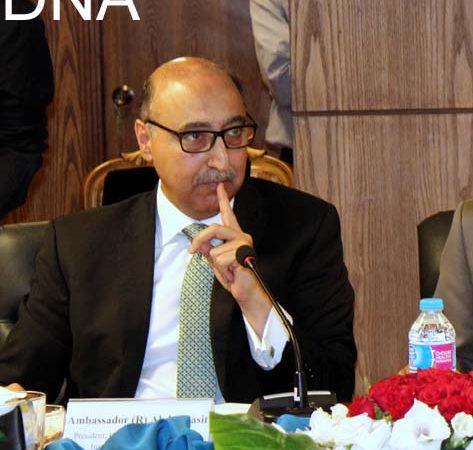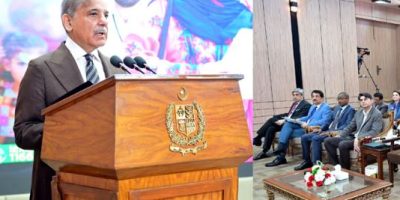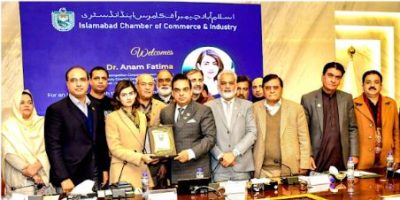IPRI organizes One-Day Conference on “Pakistan-India Dialogue: Imperatives, Prospects”

ISLAMABAD, APR 25 (DNA) – Jammu and Kashmir remains the most dangerous place on earth because torture, injury through deadly pellet guns, rape and extrajudicial executions of innocent Kashmiris by the Indian Armed Forces have increased exponentially. What is needed is an all-of-Pakistan approach for this issue. Unless, there is national consensus and an aggressive media campaign to support the Kashmiris, there can be no way forward.
The Government of Pakistan should use all means necessary including negotiations, arbitration, legal recourse, diaspora, and diplomacy to highlight Indian Occupied Kashmir’s nonviolent struggle.
While maintaining détente with India, the country’s policy-makers and thought leaders should also approach the international community at all forums to highlight its human right violations and uncompromising and hostile attitude in Jammu and Kashmir.
Pakistan also needs to set its own house in order because only then it can impress upon the global community, and India, that it is in the mutual interest of both countries that their disputes, especially Kashmir, are resolved to herald an era of goodwill, peace and progress in South Asia.
These were some of the issues discussed at the One-Day Conference on ‘Pakistan-India Dialogue: Imperatives and Prospects’ organized by the Islamabad Policy Research Institute, here in Islamabad today.
Dr Farhan Hanif Siddiqi, Associate Professor from the Quaid-i-Azam University argued that relations between India and Pakistan can be characterised as one of ‘frenemies’ – alternating between periods of peace and conflict. Dr Siddiqi pointed out that now, however, conflict has become an overarching feature of their bilateral relationship with New Delhi claiming 860 ceasefire violations in 2017, and Pakistan blaming India for 1,970 ceasefire violations in the same year. ‘The situation has not abated even in 2018, with India blaming Pakistan for 633 violations, while Pakistan blaming India for more than 400 ceasefire violations in the first two months alone,’ he shared. The speaker was of the view that in order to move forward with peace, both countries need to look towards absolute gains with economic overtures and regional connectivity mechanisms such as CPEC and OBOR. ‘Unfortunately, the shadow of the future is still cast in strategic terms making it impossible for larger peace initiatives to be implemented and reciprocated by either side. If both India and Pakistan do not do so, and continue to engage in strategic games and relative gains, the opportunity of increased economic development promised by the ruling elites of these countries to their masses will be easily challenged and forfeited’, he concluded.
Dr Muhammad Mujeeb Afzal from the Quaid-i-Azam University presented his paper on ‘Making Pakistan-India Dialogue Possible and Sustainable: A Way Forward for Shared Future’ and highlighted that the space for negotiations in India is shrinking with the spread of the Hindutva ideology due to which there is greater animosity towards Pakistan, and Muslims in particular. This extremist ideology is why it is so easy to equate terrorism with the freedom struggle in Kashmir, he remarked. The hawkish elements in Modi’s administration want to restore India’s pride and hegemony, and this does not involve giving any concessions, rather it wants to isolate, encircle and weaken Pakistan, besides tempering its linkages with traditional allies, neighbours and potential friends.
Lt General (Retd) Asif Yasin Malik, HI (M), Former Defence Secretary, Government of Pakistan, gave a historical overview of the Kashmir issue starting with the 1948 local armed uprisings that flared in various parts when the princely state was asked to join either India or Pakistan. He lamented that despite peace pledges and confidence building measures to settle differences bilaterally through peaceful means, hardly any progress has been made. No meaningful bilateral discussions have taken place and the Kashmir dispute continues to fester. ‘The problem has been that having a good Pak-India relationship has been the corollary for the resolution of Kashmir, whereas it should be the resolution of Kashmir which should lead from the front.’ He stressed that it has never been the military which has impeded the peace process, rather the most out-of-box solutions to this conflict came from a military government. ‘It is the lack of political will and wisdom on both sides that has been the problem. Under Modi’s Mahabharat, there is no space for liberation of Kashmir. Apart from strategic reasons, Modi has made Kashmir a question of India’s survival as a state. Due to such an egoistic attitude, India cannot accept a group of people separating from it; nor a small country like Pakistan getting away with its campaign,’ he explained. The sad irony is that the people of Kashmir have become secondary in this conflict, even though they are ones who are paying its price with their lives, and the lives of their women and children. Lt General (R) Malik outlined that hopes for peace remain grim because in the global environment, there is utter apathy towards Kashmir as they do not see it as a problem, and are only concerned about nuclear war between India and Pakistan.
‘There is also negativity in the regional environment with SAARC sitting almost next to its grave thanks to being scuttled by Modi,’ he remarked. ‘What is needed is an all-of-Pakistan approach for this issue. Unless, there is national consensus and an aggressive media campaign to support the Kashmiris, there can be no way forward.
A ten-year clear and robust strategy is needed which includes an institutional mechanism within Pakistan to resolve this issue, not just a Parliamentary Committee which has unlimited resources and no capacity and teeth.
‘Membership of the Parliamentary Committee on Kashmir needs to either be re-vamped altogether or reformed so that it can actually have greater impact. Giving its chairmanship to a competent person is of utmost importance,’ he said.
Earlier, Ambassador (R) Abdul Basit, President of IPRI, welcomed the participants and highlighted that Jammu and Kashmir is not a territorial dispute between Pakistan and India, it is a political and humanitarian one. It is primarily about the Kashmiri peoples’ right of self-determination as granted to them under several United Nations Security Council resolutions, which have been accepted by previous Indian governments.
He called for greater will on the part of the government and the people of Pakistan to find a way towards Kashmir’s peaceful resolution. A special envoy to coordinate all matters related to the Kashmir dispute should be considered, he recommended.
In the interactive and packed Q/A session, a lawyer from Jammu and Kashmir urged that the Pakistani government needs to move cases of Indian brutalities to the International Criminal Tribunal since time for talks have now passed and failed, with India changing the very demographics of the region.
With Kashmir now having one of the world’s largest population of blind people due to Indian pellet gun attacks and the increasingly draconian laws being implemented by the Indian Armed Forces, urgent action needs to be taken, participants stressed
Related News

Govt taking practical steps to eradicate polio disease from Pakistan: PM
He was talking to President Global Development Gates Foundation Dr. Chris Elias who along withRead More

DMA pledges One-Window System for Islamabad traders
ISLAMABAD, JAN 28 /DNA/ – Director Municipal Administration (DMA) Islamabad, Dr. Syeda Anam Fatima, visitedRead More


Comments are Closed